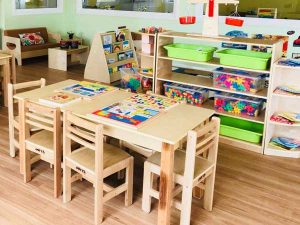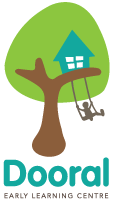Literacy And Numeracy
Literacy and numeracy from birth
Effective literacy and numeracy learning are not just about providing children with opportunities to utilise their developing skills. It is also essential that educators have a strong understanding of the concepts that they are seeking to teach.
Our program assists children to build on knowledge and skills through the use of appropriate vocabulary and information. Our educators are trained in supporting the essential skills of literacy and numbery through effective use of play based resources and learning environments as well as effective communicators.
When we talk about numeracy concepts we think about more than just number. We think about the broad areas of measurement, about spatial knowledge and the many different aspects of number.
Measurement
Exploring measurement concepts can look like this when you are interacting with a child: Early childhood professional: ‘Let’s wipe the table together.’ (Using sponges or paper towel the children wipe the table.) Early childhood professional: ‘Did you wipe to the edge? We covered the whole area!’ When we talk about ‘edge’, ‘side’, ‘top’ or ‘bottom’, children are learning about area. Children often don’t think about area. Helping children pay attention to it helps them later on when they will measure these surfaces and make comparisons.
 Spatial Knowledge
Spatial Knowledge
Young children already have some spatial knowledge that we can build upon in our programmes. For example, when making roti at home, Ashraf and his mum had the following conversation:
Ashraf: ‘Look what I made.’
Mum: ‘It’s curved like a raindrop shape.’
Using everyday words to describe shapes such as ‘a raindrop’, ‘egg shape’, ‘curved’ and ‘round’ are important for helping children understand shape. Over time children will use words such as ‘triangle’, ‘square’ and ‘circle’. These words help children to talk about the shapes in their environment. Noticing and studying shape is important for learning geometry later at school.
What do we mean by Literacy Concepts?
Long before a child utters their first word, parents/early childhood professionals and children begin to communicate. Their first communications take on the form of gestures initiated by the adults. Parents and early childhood professionals take a leading role in a child’s language development by mainly:
- talking to young children about the here and now
- being selective about the words they use
- Encouraging children to take turns in a conversation
- altering the way they say things, such as slowing down, or in the usage of short, simple sentences.
Children’s language and literacy development takes place in everyday activities accompanied by interesting talk with lots of new vocabulary words. Although the development of literacy skills is different from the development of language, it is inter-related.
Literacy is about more than knowing letters and reading some words. In the early stages, we would be looking for evidence of young children showing that they are aware of literacy in their home and in the community in which they live. Do they respond to print material that enters the home like junk mail, letters and postcards, bills and other advertising materials? Do they respond to shop signs and printed material on cartons and other packaging in the supermarket?
Young children can be responsive to the purposes of different forms of print, for instance, a list for shopping, rules to play a game, a calendar, bank books or Pokémon cards.
They can show their understanding of the links between what they experience and what they say and what is written down through such activities as telling a story that gets written and ‘read’, following a recipe for making a meal, giving and writing directions for someone to visit, and writing captions to family photographs that can be re-read. From these experiences, the young child learns that print is ‘read’ one page at a time, from left to right and from top to bottom of the page. They can also learn to recognise their own name and learn some letters through this recognition.

